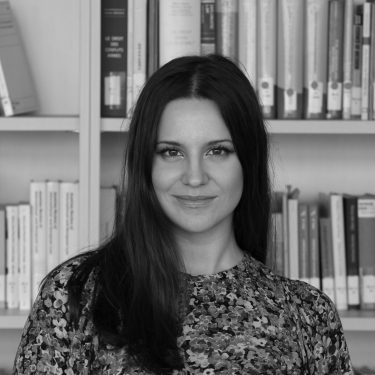Welcome to the first interview of 2023 for the Völkerrechtsblog’s symposium ‘The Person behind the Academic’! With us we have Dr. Lys Kulamadayil, and through the following questions, we will try to get a glimpse of her interests, sources of inspiration and habits.
Welcome Dr. Kulamadayil and thank you very much for accepting our invitation!
May I first ask what it was that brought you to academia?
Academia is commonly thought of as a field of knowledge production. I see it as a profession, which first and foremost requires you to be a perpetual, eager and driven learner. How else could one even hope to conduct meaningful research or be a responsible teacher? This daunting, yet truly rewarding professional requirement is what brought me to academia.
If you could, which unspoken rule of academia would you instantly erase?
Not to be too cryptic, but it might be the existence of unspoken rules to begin with. Every academic culture and every institution has its own rules and pathologies, which are not easily intelligible or necessarily appear sensible for an outsider. The further away from the core you are, the more difficult it becomes to navigate the minefield of unspoken rules, some of which seem to solely serve the purpose of protecting the core from the outside. Even if I may not like or agree with every advice offered e.g. by the “On my way out…” and ”On my way in…” publication series of the editors in chief of the European Journal of International Law, Joseph Weiler and Sarah Nouwen, I appreciate their effort of speaking some of these unspoken rules. In a way, this was also what I was hoping to achieve by co-initiating the professional skills lab for early career international law scholars. These initiatives are efforts to even the playing field. At the same time, I am aware that they are problematic in the sense that the message they send is that there is a “right way” of doing things (writing cover and reference letters etc.) and that this right way is determined by scholars from the core.
It seems that, however ‘in vogue’ they may be, alternative approaches to international law are still criticized among more ‘conservative’ academic circles. Any idea on why that is the case?
I am not so convinced that the categorization of alternative and conservative approaches to international law is so fruitful, when it comes to practises of critique. I prefer to think of it rather in terms of open-minded and narrow-minded academics. It is true that in many academic cultures the use of traditional research methods and of a somewhat antiquated approach of recognizing excellence is still dominant and unfortunately, many of its proponents seem to feel threatened, rather than intellectually stimulated when confronted with approaches that are different. At the same time, I have found that those committed to genuine and indeed responsible intellectual work will appreciate excellence, no matter how much it may differ from one’s own ways of thinking. Narrow, and open-mindedness however are not inherently linked to the ways on which academics conduct their own research.
Could you share with us three books/persons that have had a major impact on your perception of justice?
Hhmmm – difficult question, let me stay outside the terrain of legal academia for this one. The earliest book is without doubt the bible. The second would be Erich Kästner, specifically his poems, which I like for their simplicity and subtlety in critiquing the effects of industrialization on workers and the dynamics of fascism. The third would be ‘Outside the Door’ (Draußen vor der Tür) by Wolfgang Borchert, which is an absolute masterpiece in its depiction of the personal experience of guilt and forgiveness.
Which other factor would you say has mostly influenced your perception of justice?
Inhabiting different social and material spaces. Being part of a migrant family, I spent my childhood in India, Germany and, to a lesser extent, in the United States. My social universe included children from privileged backgrounds, but also children from daily wage workers, and children who were still haunted by the experiences of armed conflict and forced displacement. As a result, I had a sense of what injustice did, long before I understood ideas such as class, caste, racialization, location or religion.
What is your favourite place to read and write? What is always near you when you read and write?
It has changed over time. It used to be the library. Now, I have become almost too used to working from home, with occasional excursions to my favourite local Turkish coffee shop.
Which of your publications is your favourite one? And which of them is your least favourite?
My ‘first-born’ was an ESIL Reflection, titled ‘When International Law Distracts’, back in 2018. Not sure whether or not it is my favourite, but its publication has certainly given me a lot of joy and excitement. The topic really bugged me and in fact, just recently my full article ‘Grand Theft in International Law’ was published, which seeks to answer some of the questions that other scholars have raised in response to that initial ESIL Reflection. It is very gratifying to see a piece trigger responses/start a conversation. I do not have least favourite publications, simply because as an early career scholar, I have not been in this business long enough to have developed a critical distance to ‘earlier work’.
Have you ever drawn influence from any form of art in your work? Is there anything artistic about writing academic texts on international law?
If art is understood to include music and literature then yes, absolutely. I have expressed research findings by quoting to lyrics or pro verbs. I have also made sense about certain trends or movements in scholarship by viewing them through collective desires, which inspired and been well captured in art. Is there something artistic about writing academic texts? Certainly, there is something creative about it. I had a sculptural artist for a flatmate and remember thinking that her description of the slow process of moulding mass into art, reminded me of the process of moulding ideas, influences, and just the raw mass of material which undergirds every academic text into an article.
What is an energy and inspiration booster, at times when you do not have any?
Inspiration comes from outside. It can be a conversation with a colleague, a friend, a family member, a really great book or movie, a walk, a piece of art or pop culture.
Thank you very much once again for participating in our symposium and for having taken the time to respond to our questions!

Lys Kulamadayil is an international lawyer, a post-doc at Helmut-Schmidt University, and a research associate at the Geneva Graduate Institute.

